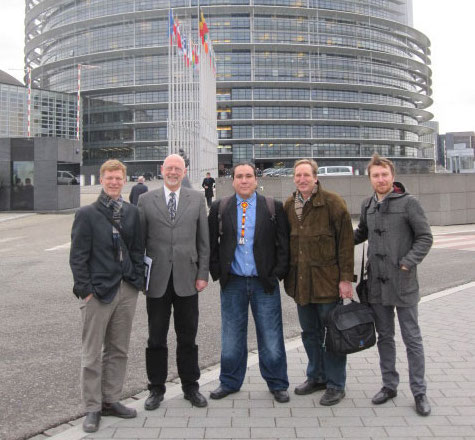A resolution on the United States-European Union Transatlantic Trade and Investment Partnership (TTIP) is expected to be voted on in the European Parliament on June 9.
Doru Frantescu, the director of VoteWatch Europe, writes, “Before the actual ratification vote [on major treaties], the Parliament usually votes, once or more times, [on] a non-binding resolution stating its position and the ‘no go’ zones, as is the case of the resolution currently being worked on in the international trade committee (INTA).”
In May 2013, one year before the most recent elections to the European Parliament, 460 Members of the European Parliament (MEPs) voted for the TTIP negotiations to ‘go ahead.’ Frantescu says that support came from the European People’s Party (EPP), the Progressive Alliance of Socialists and Democrats (S&D), the Alliance of Liberals and Democrats for Europe (ALDE), the European Conservatives and Reformists (ECR) and the Europe of Freedom and Direct Democracy (EFDD) groups.
He argues that “the MEPs that believe that TTIP should be stopped altogether will remain a small minority. The radical-left (reinforced after EU elections) will still oppose, as will the non-attached nationalists such as French Front National and some of their smaller counterparts in the other countries. The Greens/EFA [European Free Alliance] will most likely be unsatisfied with the content of the deal and also oppose it. And so will part of the EFFD group, more precisely the Italian 5-Stars Movement. Some small factions in the big groups may also not be happy with some of the provisions, and defect from the group line.”
But he cautions, “key provisions in the TTIP will be under heavy fire and their outcome is uncertain. Chief among these is the investor-to-state [ISDS] clause, a mechanism which allows investors to settle disputes with national governments in international courts, rather than national ones.”
On that front, Frantescu says, “The radical-left, the greens and the socialists look set to oppose it, on the ground that this undermines the power of the public sector/state to regulate. The EPP, ALDE, ECR (and the UKIP, the UK Independence Party) favour ISDS, arguing that independent courts are necessary so that private investors to feel confident enough to take the risk of investing in a foreign state. However, the pro-ISDS camp has lost a considerable number of seats in the EU elections (EPP alone has lost around 50 seats), while the anti-ISDS camp has gained, which makes that the balance of power among the MEPs is now extremely fragile on this topic.”
And while Frantescu argues that UKIP favours ISDS, their recently released election platform for the general election in the United Kingdom on May 7 states, “There is growing concern that TTIP may compel us to put many of our public services up for sale to US companies, thereby privatising significant parts of our NHS [the publicly funded National Health Service]. UKIP is committed to securing the exclusion of the NHS, by name, from TTIP. …Fears of what TTIP might contain precisely illustrate why UKIP believes we should leave the EU and negotiate our own free trade agreements again.”
Given the controversies, Frantescu says the European Commission will promise to reform or “soften” the ISDS provision to win some votes in the S&D group and from “some of the EPP national delegations who might have otherwise become hesitant under pressure from the pro-social civil society, particularly the German delegation (which is also the largest), but also the Italian one…”
We will also be watching this vote for the implications it could have on the ratification vote for the Canada-European Union Comprehensive Economic and Trade Agreement (CETA) expected in the European Parliament in April 2016.
In particular, we’ll be watching how the S&D group votes. Earlier this year, EU Trade Insights reported, “The European Parliament’s Socialist and Democrats Group (S&D) threatened on March 4 to vote down the ratification of the EU-Canada trade pact if no substantial improvements are made to the existing chapter on investment protection.”
The S&D group is the second largest grouping in the European Parliament with 191 seats. Their vote against CETA — along with the Confederal Group of the European United Left-Nordic Green Left (52 seats), Group of the Greens/European Free Alliance (50 seats) and the Europe of freedom and direct democracy Group (with 48 seats) — would mean a near majority of 341 MEPs in the 751-member European Parliament voting against CETA. With just 35 of the 52 “non-attached” members, including the National Front from France, also voting against the deal, CETA would be defeated.



